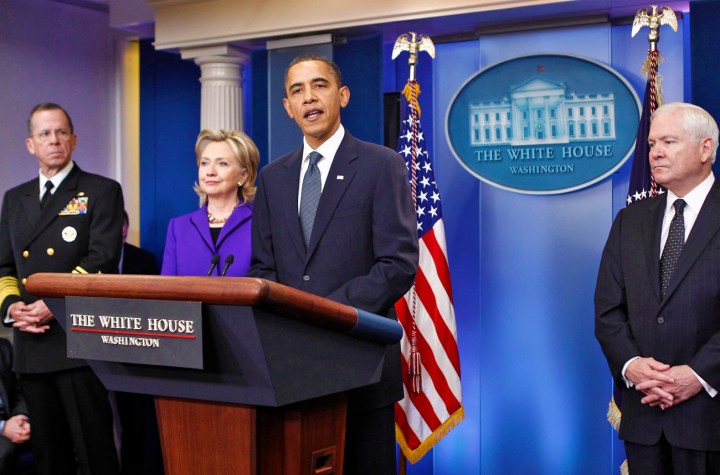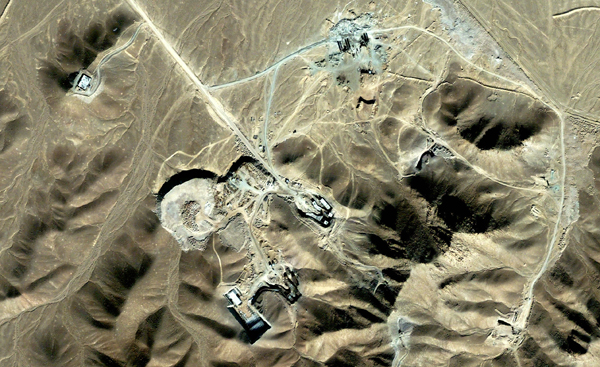Politics
Analysis: The US and Iran’s nukes – root canal or migraine?

A secret memorandum written by US defence secretary Robert Gates in January on policy options towards Iran (which, miraculously, ended up in The New York Times and other newspapers) has refocused the American policy debate over Iran. The road ahead is potholed at best.
And yes, if you were not certain by now, the leak served to re-energise this entire debate. Despite demurrers over its purpose and its conclusions, the memo has called dramatic attention to the nub of America’s conundrum. This is whether there actually is any mix of carrots and/or sticks that would induce Iran to abandon its ambitions for a nuclear arsenal – assuming it harbours such ambitions. Iran’s regime would not be the first to develop nuclear weapons as a matter of its presumed national survival or regional hegemony – think India, Pakistan, North Korea and Israel.
Presuming this is Iran’s intent – and they continue to deny this, of course, insisting their enrichment efforts are solely for medical and research purposes – Gates’ memo raises difficult questions that also call for some hard, hard thinking in other world capitals. Foremost among them is how exactly the world would contain Iran if it actually did produce a nuclear weapon? Or, further, what would Washington and its allies do if Iran acquires all of the parts, but then, tantalisingly, stops just short of bolting them together to construct an actual weapon, while letting all and sundry know it stopped just short of the final moment? There’s not much point in having a weapon if nobody knows about it – unless you’re actually at war.
Gates’ memo and the ripples from its disclosure, calls attention to the ongoing need for the US and its allies to discuss, then prepare thoroughly and cogently for such possibilities — thus giving Russia, China or anybody else no new (or recycled) reasons not to act. Or, worse, before other nations (for example, Israel) decide to act unilaterally in what they see as their national interest.

Photo: A suspected uranium-enrichment facility near Qom, 156 km (97 miles) southwest of Tehran, is seen in this September 27, 2009 satellite photograph released by DigitalGlobe on September 28, 2009. Iran’s newly disclosed nuclear fuel facility will soon become operational, an aide to Supreme Leader Ayatollah Ali Khamenei was quoted as saying. REUTERS/DigitalGlobe
Of course, military options are obviously being reviewed. Military options and plans are always under review. (Heck, there’s probably a plan to invade Canada buried in the Pentagon somewhere.) But US defence officials continue to aver that it is not clear that an actual attack would succeed. To make this very point, Admiral Mike Mullen, chairman of the joint chiefs of staff, told reporters that, while military “options would cause delay” in Iran’s nuclear project, “that doesn’t mean the problem is going to go away”.
On the other hand, the diplomatic option, by virtue of President Barack Obama’s persistent efforts, is for Iran to finally face the music of UN sanctions over its secret nuclear efforts. American credibility in this area is on the up-tick, by virtue of its earlier efforts to engage with Iran, from the new Start II treaty with Russia, from a more stable relationship with China (over nuclear wannabes, at least) and as a result of the recent Washington nuclear summit dealing with fissile materials sloshing around the world and potentially accessible to not-so-nice non-state people. And Obama continues to lobby UN Security Council members for stronger sanctions.
But there is continuing scepticism, even among the editorial writers at staunchly liberal newspapers such as The New York Times, that China and Russia will ultimately agree to Iranian sanctions that carry enough heft to do the deed. Complicating things is the history that Iran has already shrugged off earlier Security Council moves, even as it kept working away at enriching its uranium, the stuff that makes the bombs go boom.

Photo: President Mahmoud Ahmadinejad (R) receives a certificate declaring him as President of the Islamic Republic of Iran from Supreme Leader Ayatollah Ali Khamenei in Tehran August 3, 2009. Iran’s supreme leader formally approved the second term presidency of Ahmadinejad on Monday after a disputed election that leading reformists say was rigged to ensure the incumbent’s victory. REUTERS
Meanwhile, on another track, the Obama administration continues to press international corporate interests to walk away from Iran. There is some success here too. France’s Total and Italy’s Eni oil companies have said they will end new investments in Iran and Deutsche Bank and HSBC say they are withdrawing from the country. Moreover, Royal Dutch Shell, Vitol, Russia’s Lukoil and India’s Reliance have said they will stop providing refined petroleum products to the country – something Iran’s domestic oil industry struggles to produce in sufficient quantities to meet domestic demand. Taken together, these decisions could have real bite – if the companies do what they have promised – but there is still lots and lots of room for a more formal tightening of sanctions against Iran.
And here is where the Security Council can be a protective umbrella for individual efforts. Here, too, is where the news is not as good as it could be for the US. It is said that Russian and Chinese representatives continue to look for ways to tone down the stringency of possible sanctions, and non-permanent, but internationally influential members, Brazil and Turkey continue to resist stronger sanctions as well.
So, it remains unclear what mix of carrots-and-sticks will actually work and this then brings us back to the significance of Gates’ effort to discuss the question in his now-famous and not-so-secret-anymore January memorandum. After the initial report indicated Gates was worried that there was no clear way forward on Iranian policy, he hurried to argue, instead, that his goal had been “to contribute to an orderly and timely decision-making process. With the administration’s pivot to a pressure track on Iran earlier this year, the memo identified next steps in our defence planning process where further interagency discussion and policy decisions would be needed in the months and weeks ahead”. Well, okay, then. That’s clear.
Mullen then chipped in, supporting the boss, with the view that US Iranian policy on nukes and sanctions remains a work in progress. Or, as the admiral said, “It has been worked and it continues to be worked. If there was an easy answer, we would’ve picked it off the shelf.” Military planners, meanwhile, are looking to reconfigure defence architecture, i.e. missile defence installations, for the Persian Gulf region, reworking plans first designed at the end of the Bush administration.
Summing up, Gates insisted, “The memo was not intended as a ‘wake-up call’ or received as such by the president’s national security team. Rather, it presented a number of questions and proposals intended to contribute to an orderly and timely decision-making process.” Well, his memo and the ensuing discussion have certainly managed to do this, inside the Obama administration, throughout the foreign policy community and around the world. And, almost certainly, in Tehran as well.
By J Brooks Spector
For more, read the New York Times, the New York Times, the New York Times, the New York Times and ABC News, among others.
Main photo: U.S. President Barack Obama comments on the new START nuclear arms reduction treaty at the White House with Chairman of the Joint Chiefs of Staff Admiral Mike Mullen (L), Secretary of State Hillary Clinton and Defense Secretary Robert Gates (R) in Washington, March 26, 2010. REUTERS/Kevin Lamarque



 Become an Insider
Become an Insider